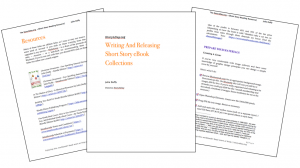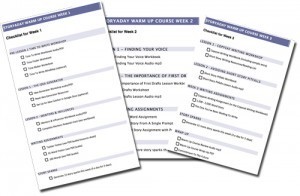Julie Duffy's Blog, page 172
January 30, 2014
Failing with Style
Why Failing Is Important
Why We Fail
- Reassess Priorities
- Reassess needs
- Reassess methods (do they match needs and priorities?)
(I have people who drop off my mailing list at various times but sign up again at others, multiple times. Maybe it’s because they’re working on a novel and don’t want to think about short stories. Maybe it’s because their painting or crafting have suddenly demanded to become First Priority. Maybe they feel guilty that they’re not writing as much as they thought they wanted to, but later realise that they miss the community here and want back in. What StoryADay has to offer isn’t meshing with their current priorities, needs and methods. It’s fine.)
What To Do
Set your priorities
Be realistic about what you can do
Set very low minimums (I’m aiming for 100 words a day. On Jan 1 I wrote 128. Jan 2: 216; Jan 3: 321 and every day it got easier)
Assess what has worked and what hasn’t.
View this dispassionately. You’re not a failure. You don’t ALWAYS fail. You’re planning to write for the rest of your life, right? Your methods and needs will naturally change over time. What’s working now? What’s not? Why are you hanging on to old ways? What do you stand to lose if you forgive yourself? What do you stand to gain?
So, what




January 21, 2014
[Write on Wednesday] That Wasn’t There A Minute Ago
This week I’m giving you a fairly specific prompt, and guiding you through the story opening with a series of questions. Use this prompt in any setting, any genre, any time period. Use it again, in a completely different setting. In fact, why not bookmark it now (do people still bookmark things?) and come back to it whenever you’re stuck.
The Prompt
Your character is at work, in a place they know well. Suddenly they notice something that wasn’t there last time they looked.
Tips
Don’t try to answer all these questions at once. Write a sentence or two before you look at the next question:
What is your character seeing/experiencing/smelling/touching/thinking about as part of their daily grind?
What do they notice, that is out of place?
Why does it suddenly stand out?
How does it relate to the character? (Pause here to think about your character’s backstory. Don’t put this in the story yet, but in your own head give your character a reason to connect/recoil from this new thing.)
Describe the object, bearing in mind how your character feels about it (but don’t tell us how your character feels about it or why)
What does your character want to do? What will you let them do?
What happens next?
How does it end?
Go!




[Write on Wednesday]
This week I’m giving you a fairly specific prompt, and guiding you through the story opening with a series of questions. Use this prompt in any setting, any genre, any time period. Use it again, in a completely different setting. In fact, why not bookmark it now (do people still bookmark things?) and come back to it whenever you’re stuck.
The Prompt
Your character is at work, in a place they know well. Suddenly they notice something that wasn’t there last time they looked.
Tips
Don’t try to answer all these questions at once. Write a sentence or two before you look at the next question:
What is your character seeing/experiencing/smelling/touching/thinking about as part of their daily grind?
What do they notice, that is out of place?
Why does it suddenly stand out?
How does it relate to the character? (Pause here to think about your character’s backstory. Don’t put this in the story yet, but in your own head give your character a reason to connect/recoil from this new thing.)
Describe the object, bearing in mind how your character feels about it (but don’t tell us how your character feels about it or why)
What does your character want to do? What will you let them do?
What happens next?
How does it end?
Go!




December 24, 2013
[Write On Wednesday] Family Drama
Oh families. The source of so many off the stories we whisper to friends, but are afraid to commit to paper for fear of offending anyone. Today’s prompt encourages you to dig into that vast repository of family stories for a ‘cheap’ way to find a plot.
The Prompt
Write a story about a stranger at a family gathering.
Tips
Think about a family gathering you’ve been to (yours or someone else’s) – preferably one where one of your most colorful relatives was on great form.
What would that look like to a stranger? (Uncle Bob’s new girlfriend or the lonely new neighbor someone invited as a nice gesture)
Take that real-life story as a jumping-off point.
Decide on a protagonist: is it your stranger or the person who invited them? Think about the protagonist’s history. What’s in their past that’s going to make this situation especially hilarious or poignant or tragic? (You don’t have to explain this in the story, but if you know about it, you’ll be able to make this character richer as you write.)
Pick one tiny incident — someone storms out, someone smashes a plate in frustration, someone swears inappropriately. Illustrate the moment and/or the ripples around the room after it happens. (Remember, this is a short story. You can’t tell too much.)
Concentrate on making the reader feel something: make me cringe with embarrassment, make me love the old grandpa, make me feel your protagonist’s regret when he misses a once-in-a-lifetime opportunity to say what he really feels…
Go!




December 19, 2013
Publish Your Own Short Story Collection
Around here we’re all about creativity. I don’t talk much about publishing because:
a, there’s plenty of material online about how to publish/get published and
b, Worrying about the publishing part before the writing part seems like putting the cart before the horse.
However, many of you have come along on the StoryADay May creativity binge a few times now and are starting to wonder “What Next?”
I strongly advocate trying many different things to get your work into the hands of readers, from submitting to traditionally-published magazines, publishing online, and yes, even self-publishing.
This summer and autumn I focused on putting together batches of stories that could be packaged together and sold as ebooks. Then I published them myself.
I’ve never felt more inspired, so I wanted to share the steps with you.
Why Write & Publish A Short Story Collection eBook?
It imposes deadlines and a finite end to each project
It can inspired you to finish and polish your stories
Setting my own them and writing my own ‘themed anthology’ helped me focus on what to do every time I scheduled a writing session.
Because I was sick of only writing to someone else’s specifications and then spending weeks waiting to hear back to hear that I hadn’t quite hit what they needed 1. I wanted to feel like I was spending more time writing than researching markets.
To build an audience of readers, not just other writers (much as I love my online writing buddies, we all need readers!).
To build a track record of publications with reviews and feedback.
Was It A Success?
A resounding success.
My experiment is still a bit of a work in progress as I have only released a few things, and my marketing is designed to produce results over the long haul. But I can tell you that I have never been more inspired or productive in my writing life. Just the thought of taking control, seeking feedback from trusted writing friends, polishing and releasing these stories, has filled me with drive and broken through any number of writing blocks in the past few months.
Because my marketing plan isn’t fully in place yet (and relies on more collections being released over the next year), I’m not going to talk about sales figures yet.
 Get The Blueprint – Free!
Get The Blueprint – Free!I am, however, going to share how I got the books out into the world, created mechanisms for gathering reader feedback and began to share my stories with the world.
If you’re already on the StoryADay mailing list you should have received a copy of the lesson I put together, sharing what I did (check your email).
It contains everything from:
How (And Why) To Write & Polish a Themed Batch Of Stories
My Timeline For Putting Together An eBook
Preparing for Publishing (including preparing the text and cover, and what you must include to ensure readers connect with you)
Working with Amazon to Create A Kindle Edition (including a walk-through of the publishing process)
Working With Smashwords To Create Other eBook Formats (including technical details and tips on how to use Smashwords to increase your book’s reach)
What I Did To “Release” The Book (includes how I sought reviews, spread the word and gathered feedback)
What Next? (Includes tips for ongoing marketing, and planning the next collection)
Your Turn (A pep-talk on the three most important steps you must take if you’re going to try this)
Resources (includes links to all the services I use for publication and promotion.
If you’re not on the mailing list you can add yourself now and receive your free copy of my detailed guide to Publishing Your Own Short Story Ebook Collection
Subscribe Now
I won’t stop submitting to magazines and online publications. I just needed another outlet too! ↩




Writing Through The Holidays
You’re busy. Or you’re sad. Or you’re conflicted. Or over scheduled. Or delirious with excitement.
Whatever the holidays mean to you, this time of year can be a killer for your writing productivity.
Depending on what you’re working on, that can be OK. Or perhaps you will need to continue to carve out some serious work time even though the 12 Tribes of HisFamilyAndYours are descending on you, daily.
Here are some encouraging words from me to you, on how to keep your inner writer and your outer productive-member-of-society happy together at the year’s end.
What Do You Need?
We’re used to asking what our characters need, but for once, let’s look at what YOU need, as a writer.
If You’re In The Middle Of A Project
If you have an ongoing project like a long short story, a story you’ve just started or a novel, you really will have to make time every day to write. The good news is you don’t have to do much. Even 250 words a day will keep your head in the project and your characters in your head. The even better news is that getting back to your imaginary world for even this little time every day, will be an incredible mood booster. Sneak off to a spare room for 30 minutes, come out smiling (and get the extended family talking about what on earth you keep in there!).
If You’re Between Projects
If you don’t have an ongoing project, my best advice for you is: don’t worry.
Don’t worry about trying to craft stories when you’re temporarily overwhelmed with commitments.
Don’t worry about writing stories when you have people you enjoy hanging out with.
Do keep a notebook or your smartphone nearby and make notes. Capture moments, turns of phrase, jaw-droopingly inappropriate comments by in-laws (note: you may have to excuse yourself and run to the bathroom so people don’t know you’re writing about them). Use this time of enforced activity and sociability to capture all these things and call them Story Sparks.
Don’t worry about what these Story Sparks might or might not turn into, just yet. Write them down. Keep them safe.
Keep Yourself Sane By Journalling
We write because we need to get the voices out of our heads, or because we need to know how we feel about things.
Just because you don’t have time to craft short stories over the holidays, don’t let that drive you insane.
Take a pretty notebook with you (keep it safe) and your favorite pen, and just write. At the start or end of the day, or in any stolen moment, write about your day.
Write about what pisses you off.
Write about what delights you.
Write about what scares you.
Let your handwriting reflect your mood. Write tiny letters or huge scrawls or in jagged, stabby motions.
Try to write at least one sentence in there that uses some of your writerly skills, but mostly, just let the voices out.
You don’t need ever look at this journal again (though it might be useful to drag it out in July when you are both thinking of writing holiday stories for submission to winter holiday markets and making your own Christmas plans for next year!)
Here’s wishing you a peaceful and fruitful holiday season. I hope you get some rest, and manage to keep your inner writer healthy, wealthy and raring to go in the New Year.




December 4, 2013
Best Of The Web for Short Story Writers – November 2013 Edition
Every so often I post lists like this (like a real, old-fashioned ‘weblog’) of recommended reading from around the web, especially curated for short story writers. Here’s the latest. You can read more like this here.
Write Every Day
http://www.salon.com/2013/11/25/nicholson_bakers_best_advice_writers_must_write_every_day/
Nicholson Baker says you should write every day
(And provides a few ways you can cheat and still succeed!)
Four Reasons To Write The Hell Out of What’s Left Of 2013
http://blog.pshares.org/index.php/fou...
by Ploughshares Literary Magazine
A funny-serious look at productivity in December (and why not to wait for Jan 1)
It’s Alive! When Your Hibernating Story Wakes Up
http://www.everydayfiction.com/flashfictionblog/its-alive-when-your-hibernating-story-wakes-up/
by Sarah Crysl Akhtar …because flash stories don’t prey on your mind the way a novel would, writing them is refreshing rather than exhausting…
Finding Focus
http://zenhabits.net/finding-focus/
By Leo Babauta Do you ever have one of those days when you just can’t seem to find focus? When you fritter away your time on nothingnesses, distractions, wandering without really doing something important? Or one of those weeks?
Shared Storytelling Challenge
http://isawlightningfall.blogspot.co.uk/2013/11/shared-storytelling-advent-ghosts-2013.html
by Loren Eaten
Advent Ghosts seeks to recreate the classic British tradition of swapping spooky stories at Yuletide. However, instead of penning longer pieces, we post bite-sized pieces of flash fiction for everyone to enjoy. It’s an open call for anyone interested, so why not join us? December 20 is Ghost Day!
From Novels to Shorts and back again
http://womagwriter.blogspot.com/2013/11/guest-post-sam-tonge-from-novels-to.html
by Sam Tonge. How writing short stories after writing novels helped her become a better (more marketable) writer.
The Rule of Three
http://thewritepractice.com/the-rule-of-three/
Part of storytelling is creating something memorable… One of the most effective ways to enforce memory is through repetition, and so one of the most common storytelling techniques was born: the Rule of Three.
What Every Writer Must Know About “Hero Fact”
http://storyfix.com/what-every-writer-must-know-about-hero-fact
A guest post by Jennifer Blanchard In my work as a writing coach, I come across a lot of stories where the hero isn’t being heroic. Either the hero is being saved by someone else or there’s not enough conflict to force the hero to actually step up and earn the title.
Secrets of The Phantom Tollbooth: Norton Juster and Jules Feiffer on Creativity, Anxiety, and Failure
http://www.brainpickings.org/index.php/2013/10/04/the-phantom-tollbooth-documentary/
“Failure is a process … you have to fail over and over and over again to get anything that’s worthwhile.”
A Little Bit of Me In All My Stories
http://womagwriter.blogspot.com/2013/09/guest-post-lynne-hackles.html
by Lynne Hackles – When someone asked Lynn for her secret ingredient, she told them…
Peruvian Writers Face Off in Lucha Libro
http://www.mediabistro.com/galleycat/peruvian-writers-face-off-in-lucha-libro_b78563
Could you write a story in five minutes? In front of a live audience? While wearing a mask?
The Big List Counts 1,500+ Literary Magazines
http://www.mediabistro.com/galleycat/the-big-list-counts-1500-literary-magazines_b78692
Looking for the ideal place to publish your writing? Check out The Big List, a collection of 1,500+ links to literary journals around the world.
Don’t Apologize For Wanting To Be Paid, Flannery O’Connor Didn’t
http://thebillfold.com/2013/09/how-flannery-oconnor-did-money/
(But that doesn’t necessarily mean expecting to be paid while you’re still learning your craft)
For writers having a hard time
“Life is sometimes hard. Things go wrong, in life and in love and in business and in friendship and in health and in all the other ways that life can go wrong. And when things get tough, this is what…




December 3, 2013
[Write On Wednesday] Word List Stories
It’s back: the ever-popular (no really, it is!) exercise where we all write stories using the same list of words.
It’s silly, it’s low-stress, it is, frankly, ridiculous and it makes for a great way to break blocks or take a break after a longer or more serious project.
So here goes:
The Prompt
Write a story containing the following words
Monthly
Cute
Shortest
Wolfish
Plot
Master
World
Valuable
December
Go!




November 27, 2013
[Write On Wednesday] 100 Words For Thanksgiving
It’s almost Thanksgiving here in the US (for those non-US people: it’s a Big Deal with lots of travel and turkey and non-productivity).
So, in an effort to keep you writing but not overwhelm you, this week I’m assigning a Drabble, a 100 word story.
The Prompt
Tips
100 word stories sound like they won’t take up much time but they will take more than you think.
Remember that you don’t have much time/space to create your story. This stops you from including too much backstory, any rambling, or losing your way in the middle. Keep your mind firmly on the end.
Do write more than 100 words if you need to, then trim.
If you find yourself writing fewer than 100 words, look back and see if you can beef it up with pointed dialogue, expressive description or more of your main character’s emotions.
You can make the theme of the story ‘Thanksgiving’, ‘gratitude’ (or lack thereof), or something completely different if inspiration strikes.
Go!




November 14, 2013
Short Story Bootcamp
Sick of all those fancy novelists with their National Novel Writing Month and their writing sprints and endless blog posts about productivity, character arcs and all that novelly stuff?
“Where’s the support for short story writers?” you cry. And rightly so.
[I kid! We love novelists. More than half of us ARE novelists!]
For while we love our novel-writing fellows, we lovers of the short story don’t always want to write novels in November. Or maybe we’re just not in a novel-place right now. Sometimes we just want to write stories. Sometimes it’s just as hard to sit down and write a short story as it is to sit down and write a novel. And we get grumpy in November, when we’re forgotten about.
Well grump no more.
The StoryADay Warm Up Course is back, but this time it’s personal.
Seriously.
I’ve beefed up the course with personal coaching calls and expanded materials, without losing any of the awesome results-driven focus of the original course. This time you get at least one personal call with me as well as a Q&A teleseminar. You also get worksheets to keep track of your progress (and I’ll be asking to see them!)
That’s right, it’s a Bootcamp and I’m your drill sergeant, only friendlier. A friend-sergeant. A drill-friend. Something.
Interested?
The course starts on Monday November 18, 2013. Three weeks later you’ll have:
10 completed stories under your belt,
More story ideas than you can use in a month, and a method for generating them forever, so you need never again fear the blank page,
The confidence to know you can make writing an on-going part of your life,
Practice and discovery of your best working habits.
Coaching that cuts through your excuses and helps you find a way to write every day, not someday.
$147 $97
(until midnight Sunday, 17, 2013)
But wait, there’s more
(Yeah, I said it)
Bonus Coaching Sessions
You can also add on four additional coaching sessions (one for each of the second and third weeks of the course, one at the end to launch you into the next phase of your writing life, and another one a few weeks later to make sure you’re still on track).
During these 45 minute sessions we can tackle:
Productivity
Creative blocks
Time management
Story points
Your plan for developing your writing career
And I will critique one of your stories each week, to review your progress and help with your writing development.
If you’re really serious about getting your writing life in gear, this kind accountability will make the difference between wishing and doing.
 Add on the Bonus Coaching now? $147
Add on the Bonus Coaching now? $147











